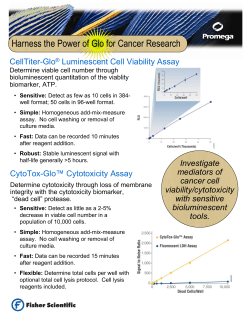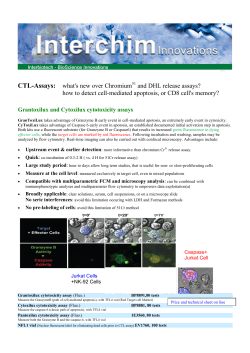
Data Sheet - BioAssay Systems
BioAssay Systems Sialic Acid ESLA002.pdf EnzyChromTM Sialic Acid Assay Kit (Cat# ESLA-100) Quantitative Colorimetric/Fluorimetric Sialic Acid Determination DESCRIPTION SIALIC ACID is a general name for nine carbon acidic sugars with N- or O-substituted derivatives. The most common member of these sugars is N-acetylneuraminic acid (NANA). Sialic acid is widely distributed throughout mammalian tissues and fluids including serum. Sialylated oligosaccharides have been shown to exhibit antiviral properties and are also known to influence blood coagulation and cholesterol levels. The Sialic acid level in body fluids is also an important marker for diagnosing cancer. Simple, direct and automation-ready procedures for measuring sialic acid concentrations find wide applications in research and drug discovery. BioAssay Systems' sialic acid assay uses a single Working Reagent that combines NANA aldolase, pyruvate oxidase and hydrogen peroxide determination in one step. The color intensity of the reaction product at 570nm or fluorescence intensity at λem/ex = 585/530nm is directly proportional to sialic acid concentration in the sample. KEY FEATURES Sensitive and accurate. Use as little as 10 µL samples. Linear detection range in 96-well plate: 0.02 to 1 mM sialic acid for colorimetric assays and 2 to 100 µM for fluorimetric assays. Simple and convenient. Can detect free sialic acid by addition of a single working reagent and incubation for 60 min at room temperature or total sialic acid by pre-treating samples with a 60 min hydrolysis step. 3. Incubate 60 min at room temperature. Read optical density at 570nm (550-585nm). Note: if the Sample OD is higher than the Standard OD at 1 mM, dilute sample in water and repeat the assay. Multiply result by the dilution factor. CALCULATION Subtract blank OD (water, #4) from the standard OD values and plot the OD against standard concentrations. Determine the slope using linear regression fitting. The sialic acid concentration of a Sample is calculated as ODSAMPLE – ODH2O X n Slope [Sialic Acid] = (mM) where ODSAMPLE and ODH2O are the optical density values of the sample -1 and water, Slope is the slope of the standard curve in mM and n is the dilution factor of the sample (n = 6 for hydrolyzed samples and n = 1 for free Sialic Acid samples). Conversions: 1 mM NANA equals 30.9 mg/dL or 309 ppm. FLUORIMETRIC PROCEDURE Direct Assays: sialic acid in biological samples. 1. For fluorimetric assays, the linear detection range is 2 to 100 µM sialic acid. Dilute the Standards prepared in Colorimetric Procedure 1:10 in H2O. Transfer 10 µL standards and 10 µL samples into separate wells of a black 96-well plate. KIT CONTENTS (100 tests in 96-well plates) 2. Add 90 µL Working Reagent (see Colorimetric Procedure). Tap plate to mix. Assay Buffer: 10 mL Enzyme: 120 µL Dye Reagent: 120 µL Hydrolysis Reagent: 10 mL Neutraliztion Reagent: 5 mL Standard: 500 µL 10 mM Sialic Acid Storage conditions. The kit is shipped on ice. Store all kit components at -20°C. Shelf life of six months after receipt. Precautions: reagents are for research use only. Normal precautions for laboratory reagents should be exercised while using the reagents. Please refer to Material Safety Data Sheet for detailed information. BOUND SIALIC ACID HYDROLYSIS PROCEDURE Note: For measurement of free sialic acid, this procedure should be skipped. 1. Combine 20 µL of sample with 80 µL Hydrolysis Reagent in a microcentrifuge tube (screw cap tube is preferable) and incubate at 80°C for 60 min. 2. Allow sample to cool to room temperature and briefly centrifuge at 14000 rpm to spin down the hydrolysis mixture. 3. Incubate 60 min at room temperature and read fluorescence at λex = 530nm and λem = 585nm. If assays in 384-well plate are desired, use 5µL Standards and 45 µL Working Reagent. The sialic acid concentration of a Sample is calculated as [Sialic Acid] = MATERIALS REQUIRED, BUT NOT PROVIDED Pipeting devices, centrifuge tubes, Clear flat-bottom 96-well plates, black 96well or 384-well plates (e.g. Corning Costar) and plate reader. 570 1. Equilibrate all components to room temperature. Prepare a 1 mM Standard Premix by mixing 50 µL of the 10 mM Standard and 450 µL dH2O. Dilute Standard in distilled water as follows. No 1 2 3 4 Premix + H2O 100µL + 0µL 60µL + 40µL 30µL + 70µL 0µL + 100µL Vol (µL) 100 100 100 100 1.00 Sialic Acid (mM) 1.0 0.6 0.3 0 Transfer 10 µL standards and 10 µL samples into separate wells of a clear flat-bottom 96-well plate. 2. For each reaction well, mix 93 µL Assay Buffer, 1 µL Dye Reagent and 1 µL Enzyme in a clean tube. Transfer 90 µL Working Reagent into each assay well. Tap plate to mix. Freeze unused reagents for future use. Δ OD Note: SH-group containing reagents (e.g. mercaptoethanol, DTT) may interfere with this assay and should be avoided in sample preparation. X n (µM) where FSAMPLE and FH2O are the fluorescence values of the sample and -1 water, Slope is the slope of the standard curve in µM and n is the dilution factor of the sample (n = 6 for hydrolyzed samples and n = 1 for free Sialic Acid samples). 3. Add 20 µL Neutralization Reagent to each hydrolysis reaction, briefly vortex to mix and briefly centrifuge at 14000 rpm to spin down the reaction. The samples are now ready for the sialic acid assay. COLORIEMTRIC PROCEDURE FSAMPLE – FH2O Slope 6.0 Sialic Acid 0.75 Δ F (X 10 4) APPLICATIONS 0.50 0.25 2 R = 0.999 0.00 0.00 Sialic Acid 4.5 3.0 R2 = 0.999 1.5 0.0 0.25 0.50 0.75 1.00 0 20 [Sialic Acid](mM ) 96-well colorimetric assay 40 60 80 100 [Sialic Acid](µM ) 96-well fluorimetric standard LITERATURE 1. Sugahara, K. et al. (1980). Enzymatic Assay of Serum Sialic Acid. Clinica Chimica Acta 108:493-8. 2. Simpson, H. et al. (1993). Serum sialic acid enzymatic assay based on microtitre plates: application for measuring capillary serum sialic acid concentrations. Br J Biomed Sci. 50:164-7. 2013 © by BioAssay Systems · 3191 Corporate Place, Hayward, CA 94545, USA · Website: www.bioassaysys.com Tel: 510-782-9988, Fax: 510-782-1588 · Email: order@bioassaysys.com, info@bioassaysys.com Page 1 of 1
© Copyright 2025









